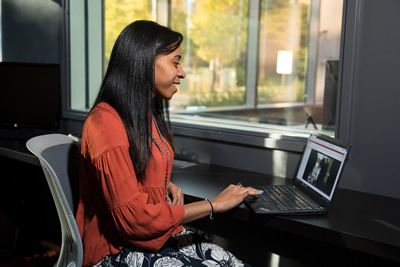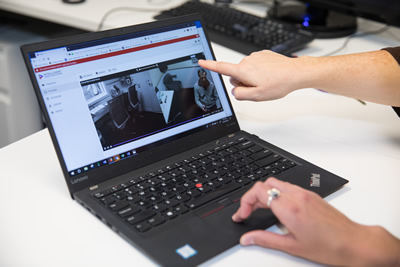
Diane Novak
Telehealth, licensure laws, petitioning state governments, time zone differences, privacy considerations, compliance with regulatory agencies, the hurdles in making no-contact hearing-aid repairs. For Diane Novak, director of the Northwestern University Center for Audiology, Speech, Language, and Learning (NUCASLL), the list of last year’s challenges has gone on and on.
“I mean, the stories!” says Novak. “And then the water was turned off! It was just nuts.”
There’s pivoting, and then there’s what Novak and her NUCASLL colleagues had to manage. In a typical year the center sees over 9,000 patients seeking hearing health, speech-language pathology, learning disability, and related services. And in addition to this outward-facing work, NUCASLL is a teaching and research facility for graduate students who need a certain number of clinical hours to fulfill their degree requirements. The logistics of both missions are immense, and when all in-person work had to cease, pushing past the roadblocks seemed impossible. But Novak and her team ensured that it wasn’t.

“The clinical faculty were so worried about the students getting their hours and their clinical education that they went above and beyond,” she says. “Anything you would ask of them, they would do. They were just fantastic.”
For instance, clinicians scrambled to get children tested for autism when virtual evaluations weren’t allowed, switched to hosting online yoga sessions for aphasia patients, and in one case even conducted a frenzied (contactless) search for a hearing aid that a patient had dropped in the parking lot. But the move to telehealth meant they could reach more people—and people further from Evanston. Winter appointments were kept, and the Illinois State Licensure Board is now permitting telesupervision for students, a big win for clinician and patient accessibility.

“A lot of what we did were workarounds to keep things running,” Novak says. “But from a patient care perspective, we now have more opportunities to serve clients.”
Yet as NUCASLL gears up for a resumption of something closer to “normal,” one constant remains. “Our profession has a lot of value,” she says. “The opportunity to be with a clinician and have that human contact and the time allotted to ask questions—people really appreciate being in person.”
